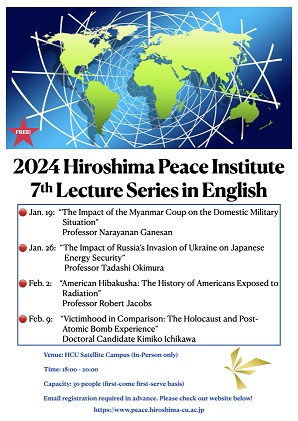The Hiroshima Peace Institute (HPI) held its seventh Public Lecture Series in English. In this program our lecturers presented a series of talks in English, focusing on intriguing topics in their fields of expertise. All lectures were free and open to the public.
Lecture 1
Date & Time: January 19, 2024, from 6 p.m. to 8 p.m.
Topic: “The impact of the Myanmar military coup on the domestic situation”
Lecturer: Narayanan Ganesan, Professor, Hiroshima Peace Institute, Hiroshima City University
Abstract: The Myanmar military staged a coup against the elected civilian government in February 2021 and has been in power since through the State Administration Council (SAC) composed of military officers and headed by General Min Aung Hlaing. After nearly 3 years of military rule, the country's situation has deteriorated badly. In terms of political and security issues the country is almost in a state of civil war with high numbers of civilians killed and injured alongside an equally large number imprisoned. The conflict between the Ethnic Armed Organizations (EAOs) and the People's Defence Forces on the one hand and the SAC on the other has also led to almost 2.6 million people being internally displaced and much damage to property and infrastructure. Similarly, the socio-economic situation is also poor with a significantly weakened local currency, high levels of inflation, and unemployment.
Profile of the lecturer: Narayanan Ganesan specializes in the politics and international relations of Southeast Asia. His more recent research has been focused on the ethnic peace process in Myanmar and the domestic and regional fallout from the 2021 military coup. During Myanmar's democratic transition from 2015 to 2020 he served as coordinator and trainer for the Myanmar civil service and academics at Yangon and Mandalay Universities, that was supported by the German government.
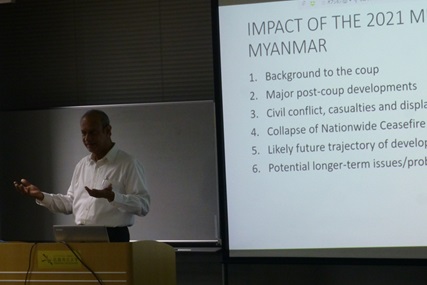
Lecture 2
Date & Time: January 26, 2024, from 6 p.m. to 8 p.m.
Topic: “The impact of Russia's invasion of Ukraine on Japanese energy security”
Lecturer: Tadashi Okimura, Professor, Hiroshima Peace Institute, Hiroshima City University
Abstract: In the wake of the Russia-Ukrainian war, energy security has become a major issue for countries that depend on Russia for energy. Other countries have also been greatly affected by the war, such as by the high price of natural gas. This lecture will examine the impact of the war in Ukraine on Japan, which has low energy self-sufficiency, from the perspective of energy security.
Profile of the lecturer: Tadashi Okimura specializes in international relations. He has primarily studied the formation of international regimes regarding global environmental issues such as climate change. He is expanding his research to global issues such as Sustainable Development Goals (SDGs), which overlap with international development, global environment, and human security.
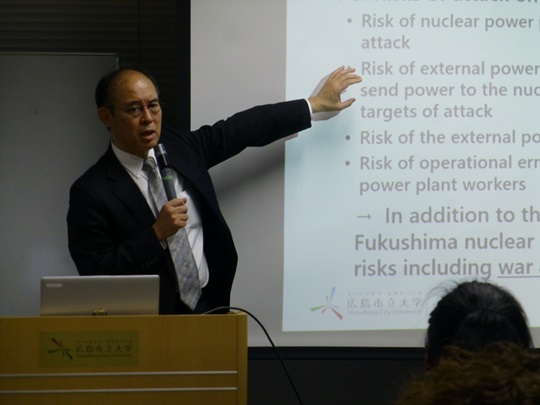
Lecture 3
Date & Time: February 2, 2024, from 6 p.m. to 8 p.m.
Topic: “American hibakusha: the history of Americans exposed to radiation”
Lecturer: Robert Jacobs, Professor, Hiroshima Peace Institute, Hiroshima City University
Abstract: Beginning in the 1920s with the case of the “Radium Girls” who were exposed to radium in their workplace, millions of Americans have been exposed to radiation and suffered health damages. Many of these people were exposed as part of the United States’ nuclear weapon program. These include soldiers exposed to nuclear detonations during nuclear testing, “downwinders” exposed to radioactive fallout following nuclear weapon tests, workers at production facilities that manufactured nuclear weapons and nuclear fuel for power plants, and also people exposed to radiation as part of medical research conducted covertly by the U.S. government to prepare to fight a nuclear war. This lecture will survey the history of these exposures and focus on how the U.S. government selected communities or populations who they deemed acceptable to expose to radioactive materials.
Profile of the lecturer: Robert Jacobs is a historian of science and technology focused on nuclear technologies. His primary area of inquiry is the global hibakusha – the millions of human beings around the world who have been exposed to radiation from nuclear testing, accidents and production. He has also recently been working on issues related to nuclear waste and deep time. His most recent book on this research, Nuclear bodies: the global hibakusha was published by Yale University Press last year.
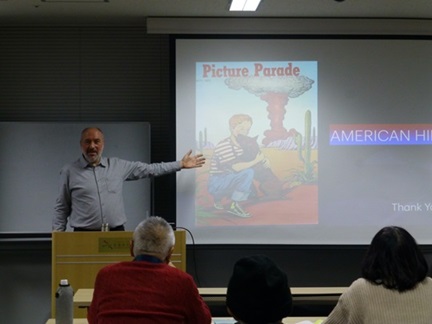
Lecture 4
Date & Time: February 9, 2024, from 6 p.m. to 8 p.m.
Topic: “Victimhood in Comparison: The Holocaust and Post-Atomic Bomb Human Experience”
Lecturer: Kimiko Ichikawa, PhD Candidate, Hebrew University of Jerusalem
Abstract: This lecture investigates the experiences of victims of unethical human experiments, focusing on two different cases: the Holocaust and the atomic bombings of Hiroshima and Nagasaki. It examines victimhood―the condition of being a victim in an unethical human experiment in atrocities, which involves various aspects of testimonies―how the victims began their experiments, continued, developed their emotions, and ended their relationships with their perpetrators at the human experiment sites. Based on a deep analysis of what the victims portray in their testimonies, this lecture seeks to understand their voices in three ways: (1) how they were treated as less than human and how they talked about their bodies during the experiments, (2) how they saw the power and politics between themselves and the people who did this to them, and (3) how they felt emotionally during the experiments.
Profile of the lecturer: Kimiko Ichikawa is a Ph.D. candidate at Hebrew University of Jerusalem who explores the field of comparative genocide research, history, and political science. She examines the diverse aspects of victimhood between the Holocaust and the atomic bombings in Japan. She is currently working on her dissertation, which contrasts the victimhood of unethical human experiments during the Holocaust and after the atomic bombings in Japan.
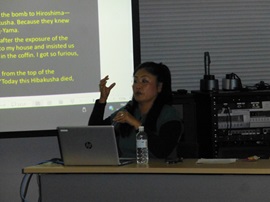
Venue
Seminar Room, Satellite Campus, Hiroshima City University
4-1-1 Otemachi, Nakaku, Hiroshima, 9F Otemachi Heiwa Building
Capacity
30 people (first-come first-served basis)

